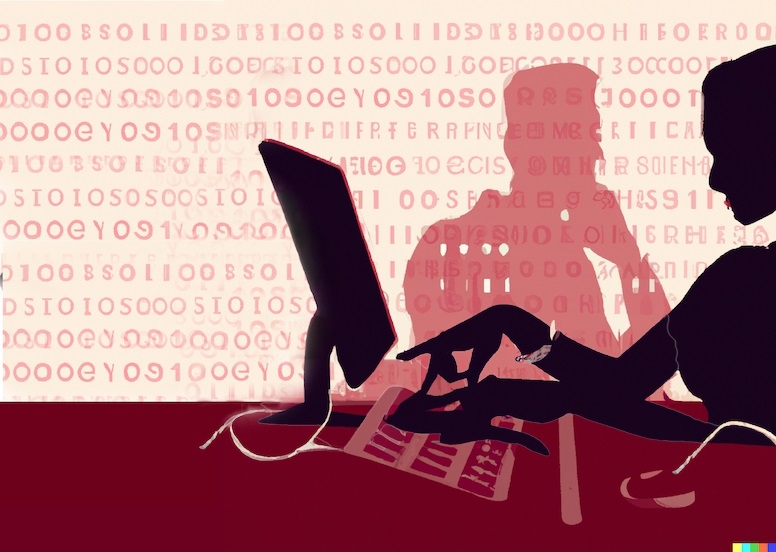Students Reach Semifinals of Cybersecurity Strategy Challenge for Second Year
| by Mark Anderson
Students had to think quick in a scenario-based competition responding to an airport security hack involving a Russian oligarch.

There’s been a massive hack of an airport security information database, and a wanted Russian oligarch is trying to flee his country.
What should the U.S. do now?
That’s the scenario that four Middlebury Institute students were dropped into as they competed in the Cyber 9/12 Strategy Challenge, a series of contests held across the world by the Atlantic Council.
Nonproliferation and Terrorism Studies (NPTS) master’s students Brandon Arcari, Kojin Glick, Maxwell Roberts, and Giovana Rodrigues Manfrin competed virtually as “MIISsion Critical” at the Washington, D.C., installment, considered the most competitive of the series.
“It’s poetic that we’re a graduate school that focuses so much on language because in cybersecurity, you’re bridging a different kind of language gap—translating between technical and policy people,” said Glick.
To add to the urgency, in the second round Glick was traveling and had to find a place to log on at the airport.
“Imagining yourself in the shoes of the national security director is a good time—even on no sleep and in the Denver airport,” said Glick.
The team beat out nearly 30 other schools to make it all the way to the semifinals for the second year in a row. Just Stanford, West Point, and the Air Force Academy advanced to the final round. Institute teams took second place in 2019 and won Best Written Brief in 2018.
“This contest is very competitive, so it’s a big deal to do this well,” said Cyber Collaborative Coordinator Philipp Bleek.
To kick off, the teams received a briefing packet stuffed with memos, news articles, social media posts, and “classified” documents. They had a week and a half to draft a response brief on how various stakeholders might respond, legal fallout, policy implications, outcomes from prior similar events, and a litany of other factors.
Over half of the teams were knocked out in the first round.
Justin Fulcher, a graduate of the joint BA/MA degree in Nonproliferation and Terrorism Studies, supported the team as a graduate assistant after competing last year. He has no doubts about why the Institute does well.
“Middlebury’s emphasis on applied learning is a critical differentiator,” he said. “Our courses aren’t merely theoretical; they’re designed to prepare us for real-world situations and practical problem-solving. This practical focus, combined with opportunities to engage with leading professionals in the field, gives us a unique edge in competitions.”
Allison Berke, Chemical and Biological Weapons Nonproliferation Program director at the Institute’s James Martin Center for Nonproliferation Studies, and who also has robust cybersecurity experience, coached the team.
“Excelling at this competition requires a familiarity with the form and structure of policy documents, the range of policy responses and areas of responsibility within the federal government and through international collaborations and treaties, and being able to think strategically and laterally through the implications of a range of responses,” she said.
Our courses aren’t merely theoretical; they’re designed to prepare us for real-world situations and practical problem-solving. This practical focus, combined with opportunities to engage with leading professionals in the field, gives us a unique edge in competitions.
She rattled off the kinds of questions they would talk through while composing their brief: If the NSA discloses that they were aware of the vulnerability, will that disrupt potential future cyber operations? Could the hack be a Russian government cover-up to help them track the fleeing oligarch? How quickly can a fix be made available if details of the vulnerability are public?
And that all happens before what Berke calls “the fast-paced part.” The students present their recommended next steps to a panel of judges, including FBI and State Department officials, who pepper them with questions. Then fresh scenario documents with new plot twists about the evolving situation are released, with just 36 hours to write a brief.
In our modern world, these kinds of scenarios are becoming less theoretical. That’s driving demand for cybersecurity professionals.
That’s why the Institute is hiring a new, dedicated cybersecurity faculty member and planning to bolster its offerings.
“We’re already doing a lot of things that are adjacent to cybersecurity, whether that’s online radicalization or protecting nuclear weapons and reactors from cyber intrusions, and have a lot of students who work in this area, but we see a lot of cool opportunities to focus on cybersecurity specifically,” said Bleek.
“What’s exciting right now is that the field of cybersecurity is still in the process of creation. Most of the people I know in it are not computer scientists,” said Glick.
He hopes to recruit students from International Policy and Development and International Trade programs for next year’s team. He emphasized that with the unprecedented scenarios the world is facing, there is no “right” answer.
“Be creative and engage with your whole self. Don’t wait for anyone to have the answer, because no one has them,” he said.
Cyber Collaborative
MA in Nonproliferation and Terrorism Studies
| by Mark Anderson
Students had to think quick in a scenario-based competition responding to an airport security hack involving a Russian oligarch.
| by Jason Warburg
Nonproliferation and Terrorism Studies professor Philipp Bleek will serve as an expert on a forthcoming National Academy of Sciences study on assessing and improving strategies for countering the threat of WMD (weapons of mass destruction) terrorism.
| by Cyber Collaborative
Soldatov and Borogan are independent investigative journalists and authors investigating Russian Cyber Activities